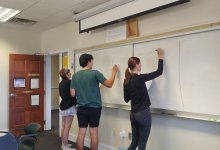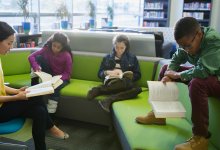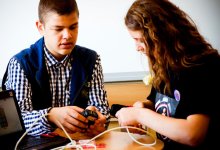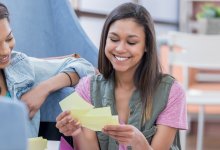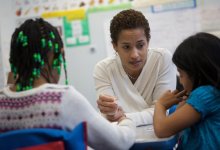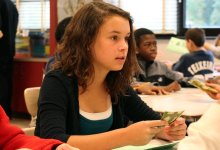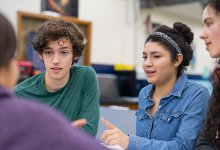Collaborative Learning
Working together to solve problems and complete projects deepens students’ learning and builds collaborative skills. Learn how to design activities to help develop these skills.
How to Support and Sustain Rich Classroom Discussions
High-functioning classrooms feature rich, inclusive discussions. Here’s how you can set students up for success before gracefully removing yourself from the equation.533How Peer Teaching Assistants Can Support Multilingual Learners
Consistent interaction with fellow students who know what it’s like to learn a new language can offer multilingual learners essential support.Activating Learning by Milling to Music
When students pretend they’re at a fancy party making small talk, a simple brainstorm for writing ideas becomes more lively, more cooperative—and more effective.9.5kA Collaborative Approach to Mistake Analysis
This method calls for students working in groups to create problems, point out common errors, find solutions, and then explain the process.2.2kSmall Group Reading Instruction in the Elementary Grades
Reading is a social experience, and these frameworks for small group instruction prioritize relationship-building while supporting reading proficiency.58622 Powerful Closure Activities
Quick activities that can be used to check for understanding or emphasize key information at the end of a lesson.50.4k5 Vocabulary Games That Build Content Knowledge
Engaging games support student understanding of subject-specific vocabulary and help ensure retention of content knowledge.2.1kDeveloping Classroom Values Collaboratively With Students
High school teachers can facilitate classroom management through an approach centered on shared values established with student input.367Student-Centered Learning: It Starts With the Teacher
Teachers encourage student-centered learning by allowing students to share in decisions, believing in their capacity to lead, and remembering how it feels to learn.23.2kGolden Rules for Engaging Students in Learning Activities
Six factors to consider in designing lessons to help increase student engagement behaviorally, emotionally, and cognitively.21.8kA Better Breakout Room Experience for Students
Five strategies that help middle and high school students form a community of learners in the virtual classroom.6.5k5 Review Activities That Kids Actually Like
Content review doesn’t need to be boring—here’s how to liven it up and make the information stick.2.8k60-Second Strategy: Cooperative Learning Roles
Giving students randomly assigned roles in their group work helps ensure that they all participate.12.5k3 SEL Practices Teachers Can Use Every Day
These social and emotional learning strategies won’t take a lot of time, but they can have a big impact on middle and high school students.5.4k60-Second Strategy: Respond, Reflect, and Review
This simple activity helps students practice giving and receiving peer feedback—and gets them out of their desks.9.5k



